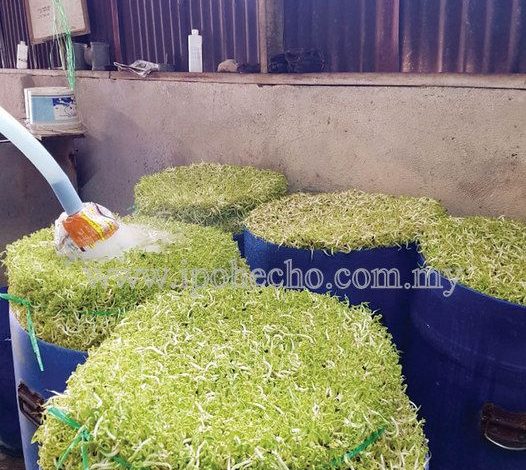



An exclusive one-on-one was done with 65-year-old Theen, owner of a bean-sprout farm run by three generations of the family for over 40 years. Upon entrance, rows and rows of blue bins containing about 90kg of sprouts each came in sight.
“I learnt how to grow the shoots from my father from young,” Theen shared during his first interview with the media.
The germination starts off with soaking the black beans for three hours. The bad, chipped ones will float leaving the good ones behind as the beans are washed. Next, the beans are watered every five hours with water from a limestone well for six days after which it is washed to remove its roots and the hulls from the shoots. It is then ready for sale.
During our visit, the sharp-eyed Theen could single out one single bad bean from the pile of soaked beans from just one glance. “Last time, we used to use mung beans which produce bean sprouts with a sweeter taste. However, the mung beans itself don’t have a long shelf life yet cost more,” he recalled.
According to him, pipe water is not suitable for growing bean sprouts as the liquid contains chlorine which results in mushy vegetables.
“The younger generation is not interested to run this farm because they do not wish to be tied down by long working hours of almost 24 hours non-stop. Plus, one needs to be observant at all times for any rotten beans or shoots in the bins,” he explained.


How does one define quality bean sprouts? The amiable Theen replied, “It has a crunchy texture. Usually the long and thin ones are less crunchy.”
He pointed out that Perak’s bean sprout farms are concentrated in the Buntong area. “In the past, we used to have over ten farms but the number has now dwindled into half. Back then, we delivered to KL because KL didn’t have their own bean-sprout farms. Last time, in the whole of Malaysia, only Buntong produced bean sprouts. Now, Johor, Bukit Mertajam, Kedah and others all have their own farms. Thus, we supply only within Perak now,” he added.
Mei Kuan


